31 prisoners hanged in Iran in one week
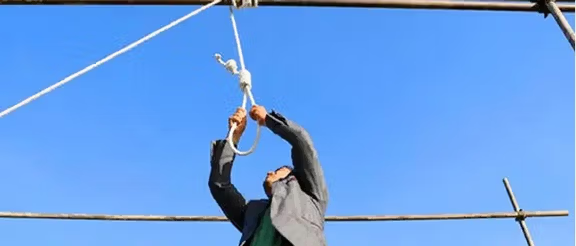
At least 31 prisoners were hanged in various Iranian prisons in one week. Another prisoner on death row also committed suicide in Ghezel Hesar prison in Karaj this week, according to human rights reports.

At least 31 prisoners were hanged in various Iranian prisons in one week. Another prisoner on death row also committed suicide in Ghezel Hesar prison in Karaj this week, according to human rights reports.
Iran led the world in executions this year, with at least 800 documented cases as of December 1, according to the Death Penalty Information Center (DPI).
"Despite the overall global trend towards abolition, total known executions worldwide increased for the third consecutive year, led by Iran, Saudi Arabia, and Iraq," according to recent data from the DPI.
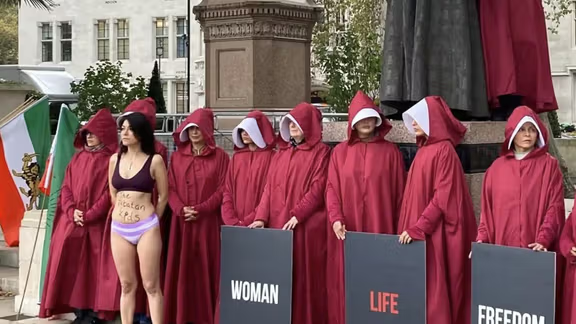
Iranian Nobel Peace Prize laureate Narges Mohammadi has drawn parallels between the oppressive system described in Margaret Atwood’s The Handmaid’s Tale and the systemic control of women in Iranian society.
Mohammadi, who has been imprisoned multiple times for her activism and is currently on a medical furlough, appeared in a video conversation with Atwood, facilitated by TIME magazine on December 18.
In the interview, the Iranian activist turned the spotlight on what she described as gender apartheid in Iran and the restriction of women’s autonomy in ways eerily similar to Atwood’s dystopian Gilead.
Margaret Atwood is a renowned Canadian author, poet, and essayist, celebrated for her profound contributions to contemporary literature. Born on November 18, 1939, in Ottawa, Canada, she is best known for her speculative fiction, including The Handmaid's Tale and its sequel, The Testaments.
Her works often explore themes of power, gender, environmentalism, and the complexities of human relationships, blending literary brilliance with sharp social commentary. Atwood's innovative storytelling and unique perspective have earned her numerous awards, including the Booker Prize, which she has won twice.
“The handmaid’s tale is quite familiar to the people of Iran,” Mohammadi said during a rare three-week medical leave from prison.
Mohammadi recounted how she began reading the novel in Evin Prison but was unable to finish it due to restrictions.
She noted how its themes and imagery have resonated deeply with Iranians, especially during the protests sparked by the Woman, Life, Freedom movement.
“Many young Iranians have been watching the Handmaid’s Tale series, and I have also heard that many performances during Iranian protests abroad have incorporated imagery and symbols from the series in solidarity,” Mohammadi said.
Atwood, speaking from New York, expressed her admiration for the courage of Iranian women in the face of systemic repression.
“I was looking at the Woman, Life, Freedom movement when it was at its height. It was remarkable, and I was amazed that they were getting away with it with all that total repression,” she said.
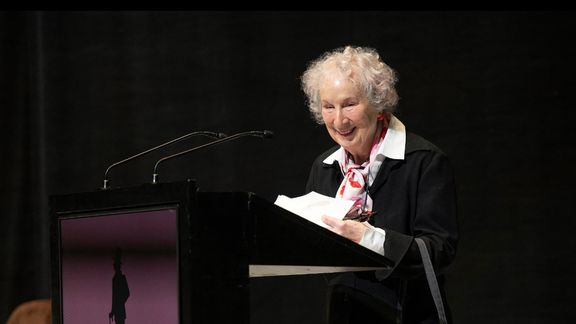
The Iranian activist also reflected on the broader societal changes driven by the movement, highlighting its transformative impact on Iranian culture.
“I see this change as a positive one specifically regarding the issue of forced hijab,” she said. “The change brought about by the Woman, Life, Freedom movement in Iranian society is remarkable. If we had tried to achieve this through traditional methods, such as religious, political, sociological, or women’s rights discussions, it might have taken far longer to reach this level of progress.”
Mohammadi, a journalist and campaigner against the death penalty, was awarded the 2023 Nobel Peace Prize for her unwavering efforts in promoting women’s rights and her relentless fight against oppression in Iran.
As a prominent voice for freedom, Mohammadi has been a leading figure in advocating for the rights of political prisoners and challenging the Iranian government's systemic injustices, including its crackdowns on protests.
Despite enduring multiple arrests, imprisonment, and harassment, her resilience and dedication have inspired millions worldwide. The Nobel Committee recognized her courage and significant role in empowering women in Iran, particularly during the Woman, Life, Freedom movement, which gained momentum following the death of Mahsa Amini in 2022 in police custody for not having proper hijab.
Use of medication to torture inmates
During the Dec. 18 conversation, Mohammadi also shared details about the inhumane treatment of women in Iranian prisons.
“One of the methods used against these women is transferring them to psychiatric hospitals,” she said. “They are given heavy medications intended for those with severe mental illness and injected with powerful drugs and even subjected to electric shocks.”
Atwood connected these accounts to historical practices under authoritarian systems. “This is very Soviet Union. This hospitalization and medication—they used to do that,” she said. “Who knows, they probably still are. And this kind of treatment was not confined to Iran.”
Mohammadi then emphasized the far-reaching consequences of controlling women in society. “When women lose control over fundamental aspects of their lives, such as their clothing, bodies, and choices through anti-women laws, it paves the way for oppressive regimes to take hold,” she said.
Atwood echoed this concern, observing how such dynamics are not confined to one country. “When I wrote it, I thought perhaps this book will become obsolete,” she said. “But the opposite has happened... This kind of total control of women, particularly their reproduction, that is already happening.”
Both women expressed hope that these stories of oppression will eventually become irrelevant. “The Handmaid’s Tale is an eternal work,” Mohammadi said.
“It continues to offer new insights and warnings in different eras.” Atwood said, “If it remains relevant, then it’s because the situation remains unequal and oppressive to women.”
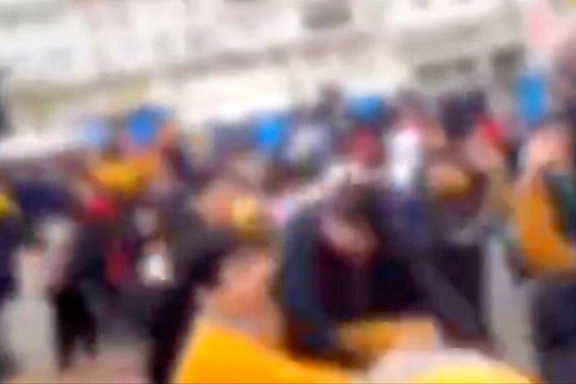
Iranian authorities have taken legal action against the officials of a boys' school in Babol, northern Iran, after a video showing students engaged in a group dance went viral.
The school officials have been summoned, and the case is being probed by oversight bodies, state-run media reported on Wednesday.

The lifting of official bans from two social media platforms on Tuesday may do little to dull the ire of Iranians about persistent government restrictions on their internet access.
As internet restrictions and social media blackouts continue in Iran, in spite of promises from President Masoud Pezeshkian to lift them, even the restricted local media have called for the resignation of his communications minister.
Sattar Hashemi has become a popular scapegoat for Iran’s complex censorship system, even if the dossier is largely out of his hands and run by the country’s ruling clerics and the security establishment.
Sazandegi columnist Faezeh Momeni said that "Hashemi has not even started the process of lifting the filtering, four months after he got the parliament's vote of confidence as IT and Communication Minister.”
An open letter called on President Masoud Pezeshkian, who in his election campaign promised to lift restrictions, "to appoint a new minister who would be committed to put an end to filtering."
The Minister of Economy, Abdolnasser Hemmati, recently said that "80 percent of Iranians use internet blockage circumvention tools [VPNs] to overcome the filtering and that imposes a cost of two million rials per month (around $3) on every Internet user."
He also said that "filtering causes heavy losses for the economy by restricting people's livelihood,” but only said that filtering is likely to be lifted gradually to avoid risking damage to “infrastructure”.
However, Iranian lawyer Kambiz Nowruzi told Sazandegi that lifting internet restrictions requires no specific infrastructure. “The decision to lift filtering only requires the approval of a majority—half plus one—of the 12 members of a committee, six of whom are representatives of the Pezeshkian administration," he said.
“If Pezeshkian can secure the support of at least one of the two representatives from the parliament or one of the four representatives from security organizations, the filtering can be lifted.”
He said the current filtering is illegal as per the country’s constitution which guarantees the public’s right to access information.
"From a legal point of view, the President can lift the filtering, but political and administrative realities of the country do not allow him to do that,” Nowruzi added.
In this year’s Freedom House report on internet freedom, the rights watchdog ranked Iran third in the world’s least free countries on digital freedom.
“The regime has taken steps to make access to the global internet more cumbersome and expensive, and drive users to a domestic version of the internet where authorities can more effectively control content and monitor users,” its report said.
“The regime also employs extensive censorship, surveillance, content manipulation, and extralegal harassment against internet users, making Iran’s online environment one of the world’s most restrictive.”
Since the 2022 uprising, the government has instructed internet service providers to increase their prices as much as 40 percent, making access significantly more expensive while localized internet shutdowns have continued.
In February, the Supreme Council for Cyberspace prohibited the use of unlicensed virtual private networks (VPNs) and pushed users seeking to access blocked or filtered web content to use domestic circumvention tools.
Internet expert Saeed Souzangar told Sazandegi newspaper that "using VPNs imposes a heavy burden on the backbone of the country's Internet system by increasing the volume of data transfers across the network."
It also diverts vast amounts of revenue to foreign companies such as Elon Musk’s Starlink. The website wrote, "There are at least 20,000 Starlink terminals in Iran and every one of them is paying at least $100 to Starlink, which adds up to $2 million per month."
Speaking about the mounting pressure on the minister of communications, Akbar Montajabi, the editor-in-chief of Sazandegi, told Rouydad24, ”The minister fears reaction by hardliners."
He said the minister is "an inefficient man who does not understand the requirements of modern living,” with millions of Iranians depending on the internet for commercial purposes.
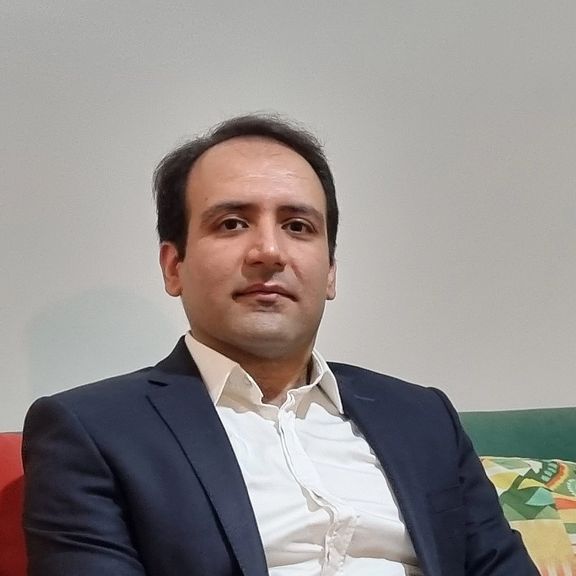
Prominent political activist Majid Tavakoli has been sentenced by an appeals court in Tehran to two years in prison, two years ban on social media activity, a ban on residing in Tehran, and a prohibition on leaving the country, his wife, Maryam Tabandeh, said on Tuesday.
Tavakoli, who was serving a six-year jail term since October 2023, was released on bail in July this year after his retrial request was accepted.
He was arrested in September 2022 at the outset of Iran’s nationwide Woman, Life, Freedom protests, sparked by the death in custody of Mahsa Amini, and was later released on bail on December 20, 2022.
Tavakoli was accused of attempting to "overthrow the Islamic Republic and establish a liberal system."
Tavakoli's activism traces back to his involvement in student protests following the disputed Presidential Election of 2009, during which he was arrested multiple times by Iranian intelligence authorities.
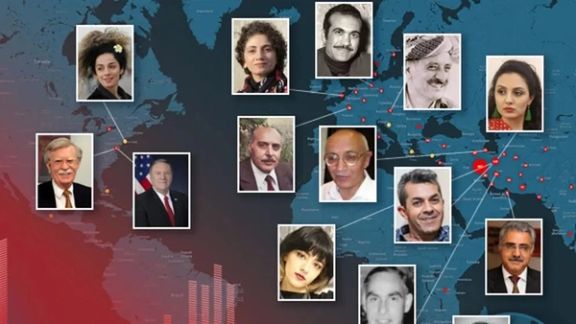
A US-based rights group has unveiled an interactive map detailing 45 years of state violence by Iran domestically and internationally, with records of 862 extrajudicial executions and 124 cases of death threats, attempted kidnappings and assassinations.
Titled "Iran: State Violence Beyond Borders," the report by the Washington-based Abdorrahman Boroumand Foundation for Human Rights in Iran (ABC) details state violence carried out in countries across the Middle East, Europe, North America, and Africa.
The foundation noted that at least 452 cases occurred outside Iran in countries including Germany, the United States, the United Kingdom, Pakistan, Turkey, Iraq, France, and Canada. They often involved Iranian officials, diplomats, and agents who have largely escaped accountability.
“This interactive map represents a critical tool to advance efforts to document and expose incidents of extrajudicial violence carried out by the Islamic Republic of Iran,” said Roya Boroumand, the foundation’s executive director.
“We hope this project moves the international community to systematically monitor and investigate these violations, prioritizing transparency and justice for the victims who have been left in the dark for far too long.”
Prominent cases include multiple kidnapping plots targeting journalist Masih Alinejad, alleged assassination attempts against Donald Trump, Mike Pompeo, and John Bolton, and efforts to surveil Iranian dissidents abroad.
The map also highlights incidents and threats documented in London, including those targeting Iran International presenters Fardad Farahzad and Sima Sabet, Iranian dissident rapper Hichkas, and women’s rights activist Fariba Baluch.
"The Abdorrahman Boroumand Center's map demonstrates, for the first time, the extent of Iran's global assassinations, kidnapping, and hostage-taking,” said Pulitzer-prize winning historian, Anne Applebaum "The Iranian regime has turned the world into a chessboard for its own deadly game, the silencing of dissent."
The foundation said that perpetrators often evade justice due to weak responses by host governments. In some cases, suspects were allowed to flee, received early releases, or faced downgraded charges unrelated to the political nature of their crimes. Such failures, ABC warned, embolden Iranian authorities.
"The perpetrators behind these crimes cannot be allowed to continue to benefit from impunity, and governments and international institutions must urgently ensure effective remedy and reparation to victims," said Nazanin Boniadi, actress and human rights advocate.
Last week, the US State Department, in its annual Country Reports on Terrorism (CRT), denounced Iran for orchestrating or supporting plots against dissidents and other perceived enemies abroad.
The report also detailed threats against Iran International, highlighting a 2023 conviction by a British court of a man who attempted to gather information for “terrorist purposes.”